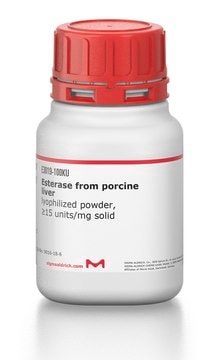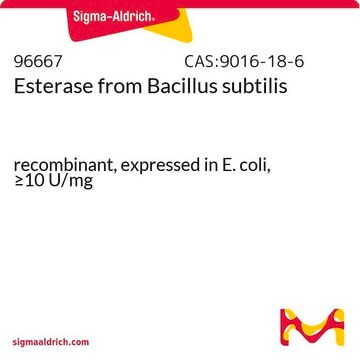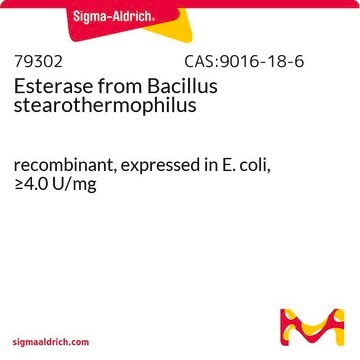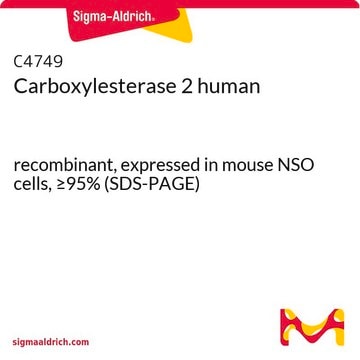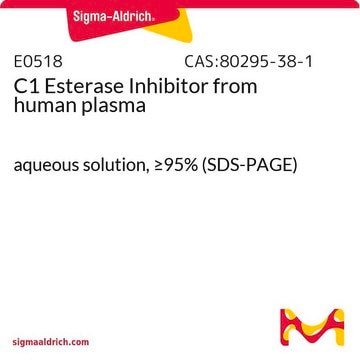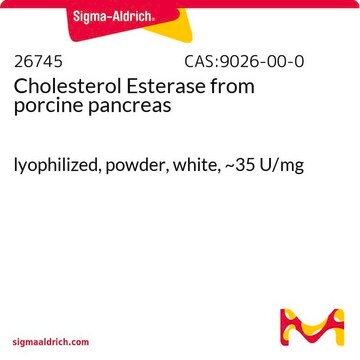E0887
Esterase from rabbit liver
lyophilized powder, ≥30 units/mg protein
Synonym(s):
Carboxyl esterase, Carboxylic-ester hydrolase
Sign Into View Organizational & Contract Pricing
All Photos(2)
About This Item
Recommended Products
form
lyophilized powder
specific activity
≥30 units/mg protein
mol wt
60 kDa
composition
Protein, ≥85% biuret
storage temp.
−20°C
Looking for similar products? Visit Product Comparison Guide
General description
Esterase belongs to the C-family of carboxylesterases. It is a glycoprotein, mainly present in the endoplasmic reticulum of hepatocytes.
Application
Esterase from rabbit liver has been used in a study to investigate a toxic effect of carbamate insecticides. Esterase from rabbit liver has also been used in a study to investigate the effect of simvastatin on expression and activity of a lipoprotein-associated phospholipase A(2).
Esterase from rabbit liver has been used:
- in comparative biophysical studies with bovine bile-salt-activated lipase in the assays with vinyl acetate, triacylglycerols, p-nitrophenyl esters and serine enzyme inhibitors
- in the catalysis and kinetic profiling studies of peptidic compounds
- in in vitro stability assays of prodrug compounds (BMS-292655 and BMS300043)
- in the hydrolysis of oleuropein aglycone (Ole-AG)
The enzyme from Sigma has been used to study the effect of divalent metal ions on the activity of esterase.
Biochem/physiol Actions
Esterase enzyme catalyzes hydrolysis of carboxylic ester to carboxylate and alcohol in the presence of water. Rabbit liver carboxylesterase catalyzes enantioselective hydrolysis of cineol derivatives.
Esterase enzyme has broad substrate specificity. Esterase from rabbit liver has been used to investigate the toxic effect of carbamate insecticides. Esterase from rabbit liver has also been used for the hydrolysis of simvastatin.
Unit Definition
One unit will hydrolyze 1.0 μmole of ethyl butyrate to butyric acid and ethanol per min at pH 8.0 at 25 °C.
Physical form
Lyophilized powder containing Tris buffer salts
Signal Word
Danger
Hazard Statements
Precautionary Statements
Hazard Classifications
Resp. Sens. 1
Storage Class Code
11 - Combustible Solids
WGK
WGK 1
Flash Point(F)
Not applicable
Flash Point(C)
Not applicable
Personal Protective Equipment
dust mask type N95 (US), Eyeshields, Gloves
Certificates of Analysis (COA)
Search for Certificates of Analysis (COA) by entering the products Lot/Batch Number. Lot and Batch Numbers can be found on a product’s label following the words ‘Lot’ or ‘Batch’.
Already Own This Product?
Find documentation for the products that you have recently purchased in the Document Library.
Customers Also Viewed
J Ozols
The Journal of biological chemistry, 262(31), 15316-15321 (1987-11-05)
A glycoprotein having a subunit weight of approximately 60,000 was isolated from rabbit liver microsomes. It is a predominant component of the hepatic microsomal membrane and reacts rapidly with diisopropylphosphorofluoridate (DFP), resulting in the loss of enzymatic activity toward artificial
Anna Sobeková et al.
Acta biologica Hungarica, 60(1), 45-54 (2009-04-22)
The activities of the antioxidant and detoxifying enzymes, superoxide dismutase (SOD), catalase (CAT), glutathione peroxidase (GSHPx), glutathione reductase (GR), glutathione-S-transferase (GST), and the content of thiobarbituric acid reactive substances (TBARS) were determined in the liver and kidney of rabbits after
Hansjörg Schwertz et al.
Journal of cardiovascular pharmacology, 52(2), 151-160 (2008-08-02)
Animal data strongly support a role for inflammation in myocardial ischemia reperfusion injury. Attempts at cardioprotection by immunomodulation (such as with the specific C5 antibody pexelizumab) in humans have been disappointing. We hypothesized that a broader spectrum antiinflammatory agent might
Z Qiao et al.
The Journal of international medical research, 37(4), 1029-1037 (2009-09-19)
Lipoprotein-associated phospholipase A(2) (Lp-PLA(2)) contributes to atherosclerotic plaque instability and subsequent sudden coronary death. Statins are associated with decreased stroke risk and may improve stability of atherosclerotic plaques. The present study investigated the effect of simvastatin on expression of Lp-PLA(2)
Shijin Zhang et al.
Langmuir : the ACS journal of surfaces and colloids, 36(22), 6261-6267 (2020-05-19)
To explore the potential of step-by-step assembly in the fabrication of biological materials, we designed and synthesized two peptide-based molecules for enzyme-instructed hierarchical assembly. Upon the treatment of alkaline phosphatase, one molecule undergoes enzyme-instructed self-assembly forming uniformed nanofibers. The other
Our team of scientists has experience in all areas of research including Life Science, Material Science, Chemical Synthesis, Chromatography, Analytical and many others.
Contact Technical Service